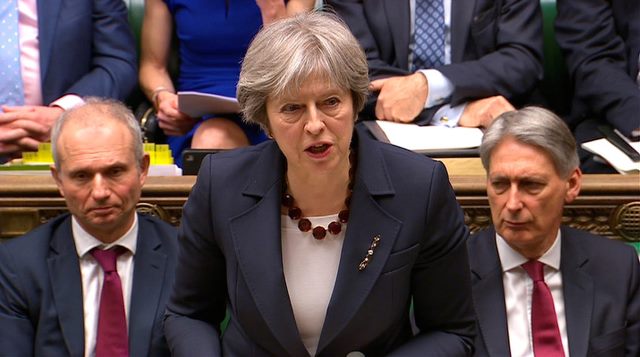British Prime Minister Theresa May will on Monday address MPs amid reports she is set to postpone a parliamentary vote on her Brexit deal in a U-turn on the eve of what was expected to be a crushing defeat.
The pound fell sharply against the dollar on the reports, which increased uncertainty over whether Britain will agree any terms with the EU before it leaves the bloc in March next year.
Meanwhile, the European Court of Justice ruled that Britain was free to halt withdrawal from the bloc unilaterally, raising hopes of those who want the whole process cancelled.
May faced a huge rebellion of her own Conservative MPs over the withdrawal agreement she struck in Brussels last month, while opposition parties are also against her.
Many of them want her to renegotiate the deal, noting the prime minister is due at a Brussels summit later this week.
May held talks this weekend with leaders including EU President Donald Tusk and German Chancellor Angela Merkel, prompting speculation she was seeking last-ditch changes.
Opposition Labour leader Jeremy Corbyn said delaying the vote was a “desperate step”.
“We have known for at least two weeks that Theresa May’s worst of all worlds deal was going to be rejected by parliament because it is damaging for Britain,” he said.
“Instead, she ploughed ahead when she should have gone back to Brussels to renegotiate or called an election so the public could elect a new government that could do so.”
A big loss risked immediate challenges to May from within her party, where eurosceptics have long accused her of trying to water down Brexit, and from Labour.
But pulling the vote also brings its own risks to the prime minister, with critics saying it was a signal of her weakness.
Pro-EU Scottish First Minister Nicola Sturgeon said if true, it was “a pathetic cowardice by a PM and government that have run out of road and now need to get out of the way”.
Defeat would have left the tortuous Brexit process in a state of flux, but so too does no vote at all.
The pound lost 0.4 percent against the dollar compared to Friday’s closing value.
Hard-won compromise
May’s Downing Street office had on Monday morning insisted the House of Commons vote was going ahead as planned on Tuesday, but minutes later reports emerged that May would seek to postpone it.
A parliamentary official confirmed the prime minister will address MPs at 3.30pm (1530 GMT) on Brexit, while her minister responsible for parliamentary business will speak afterwards.
The Brexit divorce text, which defines terms on which Britain leaves its main trading partner after 46 years, is the most important to go before the House of Commons in years.
May’s deal faced opposition from the start, but in the past two weeks she has toured the country and met with countless colleagues in a bid to persuade them to support it.
Still, more than 100 Conservative MPs — nearly one-third of the party — were reportedly against it, as were her key allies, the Northern Irish Democratic Unionist Party (DUP).
Environment Secretary Michael Gove, an influential Brexit backer, earlier cast doubt on any major re-negotiation with the EU.
He told BBC radio that “a fundamental re-opening” of the withdrawal agreement risked EU countries wanting to change it “in a way that may not necessarily be to our advantage”.
EU leaders have ruled out any re-negotiation of the divorce deal.
However, some EU officials have mentioned the possibility of changes to the accompanying political declaration on future trade ties between Britain and the EU after Brexit.
As he arrived for an EU meeting in Brussels on Monday, Irish Foreign Minister Simon Coveney said the deal was a “hard-won compromise”.
“The deal that is there… is not going to change, particularly the legal language of the withdrawal treaty,” he said.
Gove also warned fellow MPs that voting down the current Brexit deal on the table risked “either potentially no Brexit… (or) the very uncomfortable circumstances of no deal”.
The Bank of England and the Treasury warned that Britain crashing out of the EU with no new legal relationship in place could trigger a recession, crash the pound and cause a plunge in house prices.
Uncertainty has hit the economy, with official data on Monday showing that gross domestic product grew by just 0.1 percent in October from September.
May’s team insists that her vision offers the cleanest break between the UK and EU that Brexit supporters could hope for at this late stage.












